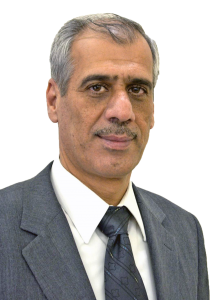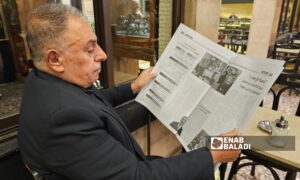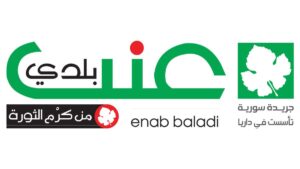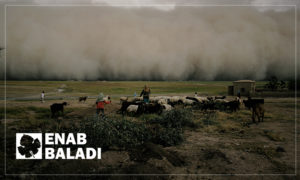 Jawad Abu Hattab Faculty of Medicine's dean in Idlib[/caption]
It is assumed exams are going to begin within the next few weeks at the end of the first term in Aleppo Free University for the year 2016/2017, at the same time the university's management seeks to receive an international recognition for its issued certificates and to increase the number of faculties in the university.
Hassan Gibran, Free Aleppo University president, an associate professor in developing sociology and social change, and former vice dean of faculty of letters and education in the university, said that the university management seeks to develop the university and to distinguish its scientific and academic performance.
He also compared Free Aleppo university with Aleppo State University saying, Free Aleppo University is free from any foreign sectarian occupation, breathes freedom and the teaching environment, since it is free from Syrian regime hegemony on state institutions, has to be away from hegemonies in order for students to be creative and learn without restraints.
Jawad Abu Hattab Faculty of Medicine's dean in Idlib[/caption]
It is assumed exams are going to begin within the next few weeks at the end of the first term in Aleppo Free University for the year 2016/2017, at the same time the university's management seeks to receive an international recognition for its issued certificates and to increase the number of faculties in the university.
Hassan Gibran, Free Aleppo University president, an associate professor in developing sociology and social change, and former vice dean of faculty of letters and education in the university, said that the university management seeks to develop the university and to distinguish its scientific and academic performance.
He also compared Free Aleppo university with Aleppo State University saying, Free Aleppo University is free from any foreign sectarian occupation, breathes freedom and the teaching environment, since it is free from Syrian regime hegemony on state institutions, has to be away from hegemonies in order for students to be creative and learn without restraints.
Free Aleppo University: New Faculties and Efforts for Recognition
 Jawad Abu Hattab Faculty of Medicine's dean in Idlib[/caption]
It is assumed exams are going to begin within the next few weeks at the end of the first term in Aleppo Free University for the year 2016/2017, at the same time the university's management seeks to receive an international recognition for its issued certificates and to increase the number of faculties in the university.
Hassan Gibran, Free Aleppo University president, an associate professor in developing sociology and social change, and former vice dean of faculty of letters and education in the university, said that the university management seeks to develop the university and to distinguish its scientific and academic performance.
He also compared Free Aleppo university with Aleppo State University saying, Free Aleppo University is free from any foreign sectarian occupation, breathes freedom and the teaching environment, since it is free from Syrian regime hegemony on state institutions, has to be away from hegemonies in order for students to be creative and learn without restraints.
Jawad Abu Hattab Faculty of Medicine's dean in Idlib[/caption]
It is assumed exams are going to begin within the next few weeks at the end of the first term in Aleppo Free University for the year 2016/2017, at the same time the university's management seeks to receive an international recognition for its issued certificates and to increase the number of faculties in the university.
Hassan Gibran, Free Aleppo University president, an associate professor in developing sociology and social change, and former vice dean of faculty of letters and education in the university, said that the university management seeks to develop the university and to distinguish its scientific and academic performance.
He also compared Free Aleppo university with Aleppo State University saying, Free Aleppo University is free from any foreign sectarian occupation, breathes freedom and the teaching environment, since it is free from Syrian regime hegemony on state institutions, has to be away from hegemonies in order for students to be creative and learn without restraints.
It is assumed exams are going to begin within the next few weeks at the end of the first term in Aleppo Free University for the year 2016/2017, at the same time the university’s management seeks to receive an international recognition for its issued certificates and to increase the number of faculties in the university.
Hassan Gibran, Free Aleppo University president, an associate professor in developing sociology and social change, and former vice dean of faculty of letters and education in the university, said that the university management seeks to develop the university and to distinguish its scientific and academic performance.
He also compared Free Aleppo university with Aleppo State University saying, Free Aleppo University is free from any foreign sectarian occupation, breathes freedom and the teaching environment, since it is free from Syrian regime hegemony on state institutions, has to be away from hegemonies in order for students to be creative and learn without restraints.
Seeking recognition
The university’s president considers that self-recognition is ‘enough’ because it arises from three points: first, the personal recognition of the offered product, and this will encourage Syrians to stay and be active actors in rebuilding Syria. Second, self-recognition depends on the power of curriculum, staff and available knowledge and teaching methods, which are primary prerequisites for scientific recognition. Finally, there should be a ground for studying and scientific research and for commitment to international standards.
According to Gibran, ‘recognition will be realized when these previous prerequisites are fulfilled and as a result reliability will be established.”
Gibran told Enab Baldi that the student, who studies in Aleppo Free University, has the right to get a recognized certificate abroad, the case for which university management communicated with Syrian people’s friends such as European Union, Turkey and several Arab countries.
On Thursday 28 January, the university`s President met with some Syrian academics in Turkey and raised the issue of recognition. Representatives from Turkish High Education Council (YOK) and the head consultant of the prime minister in addition to ten Turkish universities’ presidents who attended the meeting.
Gibran confirmed that some of his colleagues travelled to European countries for this purpose and got promises.
“We want to fulfill these promises and return consideration to work standards inside of Syria through assuring Syrian’s qualifications and creating new ones,” he explained.
There are two types of recognition: the legal one which the Interim Government provided for us and the scientific and academic recognition. Gibran considered teaching Aleppo State University’s curriculum, originally recognized, in Free Aleppo University ”makes it recognized”.
Dr. Jawad Abu Hattab, the Faculty of Medicine’s dean in Kafar Takhareem (in Idlib) considered that recognition will be similar to General secondary certificate’s recognition, issued and signed by the Interim Government, which is recognized by many countries like Turkey and France.
We started working in Free Aleppo University in the mid-Last December. The management depended on three standards to determine its faculties’ names. These should be available in Aleppo State University which is managed by the state and should be compatible with the market (according to the current situation in Syria) in addition to students’ needs.
A number of faculties were closed due to the students’ disregard to enroll in them, while Faculty of Medicine started its first year and exams will be done within the next few weeks according to the faculty’s dean in Idlib.
Abu Hattab told Enab baladi that adopting the same motto of Aleppo State University, which is run by the regime, comes from the fact that every university should have an international code and record, i.e. recognition of the university without reliable documents is ”a difficult issue because it needs a political ground. That’s why the same name and motto are used, for it is an old university founded 70 years ago.”
The faculty is Funded by Syrian doctors in the U.S. A. According to Abu Hattab, there are Two faculties: one in Ghouta (countryside of Damascus) and the other is in Idlib.
The faculty in Ghouta includes one hundred students, whereas 120 thousand students applied to Kafar Takhareem. The minimum total of general secondary school, accepted, was 217 grades.
Teaching follows the same teaching plan of Aleppo State University without any changes. Also, staff is available for the first three years. Students are trained within hospitals in ‘liberated regions’, according to Abu Hattab.
The idea of founding Free Aleppo University came from coordination between Free National Assembly and Syrian Academic Council, which includes the university’s president, Hassan Gibran, and a group of his friends, according to Gibran.
The university provides the international standards for universities, as Gibran said. He also said that it is supplied by all educational aids, in addition to labs. He added that its management now has funds which allows students to continue their first year securely.
On Gibran’s account, a great number of Syrian students abandoned their study at university due to their opposing stand to the regime in Syria. He said that the number of students before the revolution reached 225 thousand students. The university used to receive 180 thousand students yearly, while the university’s management counted students before its setting up between 75-125 thousand students in ‘liberated regions’ either left university or have not enrolled yet.
The university, run by Interim Syrian Government, includes functional staff, scientific management, and qualified academic teachers (most of them worked previously in Aleppo State University). Also, it includes many branches like information technology, economics, sciences, education, Islamic studies, mechanical and electrical engineering, as well as vocational institutes with same branches. These are distributed in Homs, Idlib, Aleppo, Daraa, Quneitra, Lattakia suburbs and Damascus suburbs.
if you think the article contain wrong information or you have additional details Send Correction
-
Follow us :


















 A
A
A
A
A
A






 More Events
More Events